Sean McBride's Blog, page 8
August 11, 2022
Blind Read Through: J.R.R. Tolkien; The Silmarillion, Of Túrin Turambar, Part 5

“And with the beginning of spring Túrin cast off his darkness, and grew hale again; and he arose, and he thought that he woudl remain in Brethil hidden, and put his shadow behind him, forsaking the past. He took therefore a new name, Turambar, which in the High-elven speech signified Master of Doom; and he besought the woodman to forget that he was a stranger among them or ever bore any other name.“
Welcome back to another Blind Read! This week we conclude the tragedy of Túrin Turambar.
Last week we left off with Túrin heading back to Dor-lómin, ignoring Gwindor’s dying wish. This week we pick up with Túrin finding his home but also finding that his mother and sister were gone, so he stopped by the house of Brodda the Easterling. This event is where Túrin completes his transition and becomes Darth Vader (forgive the crossover). The Easterlings tell Túrin that Morwen fled, and the shock of the knowledge opened his eyes, “and the last of Glaurung’s spell were loosed.” In a fury at his loss and stupidity, “he slew Brodda in his hall, and other Easterlings that were his guests.” Once again, becoming a hunted man, only this time by the people of his birth.
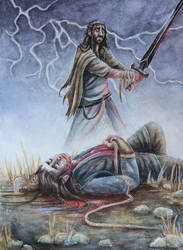
And yet Túrin justifies these murders and, in fact, every transgression of his life: “then those deeds wrought are not evil to all. And where else might I have better bestowed my kin, even had I come sooner? For if the Girdle of Melian be broken, then last hope is ended. Nay, it is better indeed as things be; for a shadow, I cast wheresoever I come. Let Melian keep them! And I will leave them in peace unshadowed for a while.” Morgoth will follow his movements because he is an incredible warrior and ignores all else. His youth and hubris show again to justify murder.
So Túrin left to search for Finduilas but found some men in the woods who told him an orc brigade killed her. They showed Túrin the body of the elf-maiden, and he went into a pang of great sadness. The opening quote of this essay comes at this point, making a turning point where Túrin accepts that he is “the Master of Doom.”
Tolkien takes us back to Doriath, where the word that there were some survivors out of Nargothrond, and Morwen, Túrin’s mother, decides she will go and find her son. Unable to stop her in this quest, Thingol bids Mablung go and protect her, but Nienor, Túrin’s sister, disguises herself to go along as well. This is the beginning of a disturbing parallel to the Beren and Lúthien tale. Remember all the times Lúthien disguised herself to go after Beren? Here we have Nienor, whom Túrin hasn’t seen for many years, and in that time, has grown into a woman, sneak out to go help find him, disguised much like Lúthien.
So this group rides out to Nargothrond, only to find Glaurung, so they retreat in haste, but in confusion, Nienor falls from her steed. She gets caught in the gaze of Glaurung, and he understands who she is through his magic. He wipes her memory and personality and turns her into a vegetable.
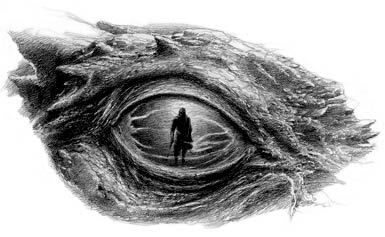
Mablung finds her and brings her with him, but Orcs assail them in the wild, and in the intervening traveling, Nienor has begun to gain her wits, if not her memory. Finally, the Elves kill the orcs, but Nienor was spooked, and she ran as swift as a horse and got lost in the wilds.
Nienor wandered through the forest; “Nothing did she remember save a darkness that lay behind her, and a shadow of fear; therefore she went warily as a hunted beast, and became famished.” Then she passed into Brethil.
Terrified and alone, she lay down on Haudh-en-Elleth, the burial mound of Finduilas – Gwindor’s prophesy was coming home to roost.
Túrin finds her there and brings her home, comforting her. She cannot even remember her name or that Túrin is her brother.
She had to be taught things “as to an infant” because Glaurung’s magic was that strong, but she learned and became a clan member. Many people had fallen for her, but it was Túrin who asked her hand in marriage, “but for that time she delayed despite her love.” Which was undoubtedly a familial love, not romantic love.
It took three years and a promise not to go to battle if she would marry him, and finally, she did, but even this oath Túrin forsook.
Orcs came and attacked Brethil, and Túrin stayed back at home for a while but eventually took up his black sword and met the orcs in battle. Because of his abilities in battle, word got out that the Black Sword was in Brethil.
Glaurung set a plan and got another army ready to march to Brethil, but he let those plans leak so that the people knew about their fate ahead of time. Terrified, they went to Túrin for advice, “and he counseled them that it was vain to go against Glaurung with all their force” and that he should try to go against the great dragon himself to trick him.
Túrin set off after the dragon, but Nienor was scared to be left behind, so she set off with a company of men after her husband/brother.
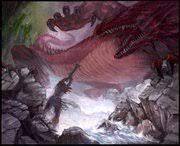
Túrin finally found Glaurung sleeping and, through the perils of getting to him, ended up reaching the dragon alone, the few men with him killed.
Túrin, undeterred, found Glaurung still sleeping. “Then he drew Gurthang, and with all the might of his arm, and of his hate, he thrust it into the soft belly of the Worm, even to the hilts.“
Glaurung was grievously injured, but he gazed into Túrin’s eyes and paralyzed the hero.
Meanwhile, Nienor heard Glaurung’s mighty cry and the people of Brethil thought that the dragon was killing the men who went forth, so she left to find him with Brandir, who loved her. He tried to lead her away, but Nienor told him,”‘The Black Sword was my beloved and my husband. To seek him only do I go. What else could you think?” But Brandir suspected the truth; Túrin and Nienor were brother and sister. What’s worse is now they are expecting a child. So Brandir only wanted to protect her.
But being part of the curse of Túrin, she left Brandir and went to find her Husband. When she finally did, lying on the ground seemingly dead, she wept until Glaurung lifted his head and saw her.
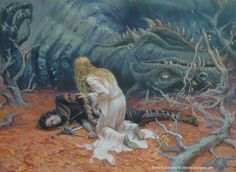
Using the last ounces of his life, Glaurung removed the spell, and Nienor suddenly remembered who she was and what she had been doing for the last number of years. She felt the child in her belly, and “she ran from him distraught with horror and anguish, and coming to the brink of Cabed-an-Aras she cast herself over, and was lost in the wild water.”
We see the parallel in the foreshadowing of Saeros at the beginning of this chapter, coming to fruition here.
Túrin woke with Glaurung’s passing and came back to Brethil. He should have been a hero, but when he heard that his wife was dead, and he learned that Brandir had come back to camp telling everyone that Túrin and Nienor (or Níniel as they called her in the base) were dead because of Túrin, what was Túrin to do? Why, what he always did! He killed Brandir in a fury of emotion but soon learned that Brandir was telling the truth and the only exaggeration was that he thought Túrin was dead when he saw his unresponsive form.
Overwhelmed, Túrin felt there was only one more thing to do. So he pulled his sword, Gurthang, and asked it, “Wilt thou therefore take Túrin Turambar, wilt thou slay me swiftly?“
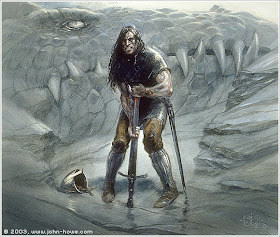
And his sword responded, “Yea, I will drink they blood gladly, that so I may forget the blood of Beleg my master, and the blood of Brandir slain unjustly. I will slay thee swiftly.”
Túrin threw himself on Gurthang, and Gurthang kept his promise and immediately took Túrin’s cursed life.
He died a hero and lay under carven runes in Doriath from then on, a hero despite his curse, and Nienor’s name was on the marker, “but she was not there, nor was it known wither the cold waters of Teiglin had taken her.”
This quote is how Túrin’s tale ends, an ultimate Shakespearean tragedy. But before I let you go, I want to note two things. The first is when Túrin speaks to his sword; not only does Gurthang respond to him, but they both speak in almost biblical language. I think this is Tolkien’s way of indicating Ilùvatar’s influence on the humans, despite his seeming indifference. Just a theory, but the language change has been happening more and more, so I’m going to keep track of when it happens.
The second item is, despite the horror and despair throughout this tale, as in all Tolkien, there’s a measure of hope at the core. Túrin was a great hero, and sometimes heroes need to be formed by adversity. Glaurung had terrorized Beleriand for hundreds of years and was near unbeatable, yet this man, cursed or not, was able to singlehandedly slay the scourge of Beleriand.
It should indicate hope moving forward despite the next chapter’s title: “Of the Ruin on Doriath.”
August 4, 2022
Blind Read Through: J.R.R. Tolkien; The Silmarillion, Of Túrin Turambar, part 4
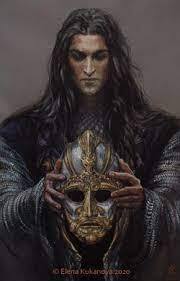
“And Túrin hastened along the ways to the north, through the lands now desolate between Narog and Teiglin, and the Fell Winter came down to meet him, for in that year snow fell ere autumn was passed, and spring came late and cold. Ever it seemed to him as he went that he heard the cries of Finduilas, calling his name by wood and hill, and great was his anguish; but his heart being hot with the lies of Glaurung, and seeing ever in his mind the Orcs burning the house of Húrin or putting Morwen and Nienor to torment, he held on his way, and turned never aside.”
Welcome back to another Blind Read! This week we continue on the journey of Túrin as Beleriand takes another turn towards the horror and desolation of Morgoth.
We left off last week with Túrin coming to Nargothrond with Gwindor, then soon after with Finduilas, Gwindor’s love, falling in love with Túrin.
Despite this perceived betrayal, Gwindor didn’t hold it against Túrin. He just considered it part of Túrin’s curse, and over time Túrin came to great glory in Nargothrond. They took his council and “built a mighty bridge over the Narog from the Doors of Felagund, for the swifter passage of arms.” They built up a vast store of arms, and “Then the servants of Angband were driven out of all the land between Narog and Sirion eastward, and westward to the Nenning and the desolate Falas.”

Gwindor spoke out against the council of Túrin, but “he fell into dishonour and one heeded him.” The problem was the curse of Túrin. The Noldor of Nargothrond thought no one was making a concerted effort to push back against Morgoth, so they heeded Túrin and moved from guerilla tactics to open warfare. The tactics worked initially, but Morgoth turned his full might against Nargothrond’s insurrection.
While the Noldor were active in the war against the evil of Angband, messengers came from the south from Círdan the Shipwright. “The Evil of the North has defiled the springs of Sirion, and my power withdraws from the finger sof the flowing waters.” So Ulmo told Orodreth, the Lord of Nargothrond, that he could not protect them in this open battle, surreptitiously telling Orodreth to return to hiding.
Yet Túrin again convinced the Noldor that they should continue the fight. “And in the autumn of that year, biding his hour, Morgoth loosed upon the people of Narog the great host that he had long prepared; and Glaurung the Urulóki passed over Anfauglith, and came thence into the north vales of Sirion and there did great evil.“
The host of Nargothrond went out to meet the armies of Angband in battle, “and none but Túrin defended by his dwarf-mask could withstand the approach of Glaurung…On that day all the pride and host of Nargothrond withered away; and Orodreth was slain in the forefront of the battle, and Gwindor son of Guilin was wounded to death.” but before Gwindor died, he told Túrin:
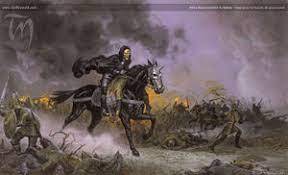
“Let bearing pay for bearing! But ill fated was mine, and vain is thine; for my body is marred beyond healing, and I must leave Middle-earth. And though I love thee, son of Húrin, yet I rue the day that I took thee from the Orcs. But for thy prowess and thy pride, still I should have love and life, and Nargothrond should yet stand a while. Now if thou love me, leave me! Haste three to Nargothrond, and save Finduilas. And this last I say to three; she alone stands between thee and thy doom. If thou fail her, it should not fail to find thee. Farewell!”
You may have noticed the overwhelmingly biblical way of speech Gwindor uses when he doesn’t sound like this earlier in the story. I think that’s because this is Tolkien’s way of foreshadowing what is to come.
Túrin is a reckless youth, and death and bad luck seem to follow him. This cavalcade of events is the true tragedy of his story because he is such a good warrior, leader, and influencer, but his youth, temper, and impetuosity get in his way. He is very much Hotspur from Hamlet. He is too quick to anger and fist.
From Saeros to Mîm, to Beleg, then Gwindor and beyond, Túrin caused their deaths because of his Hubris and impetuousness. One might look at Beren and think he had the same qualities, but Beren took precautions before he did anything. Túrin wants to meet the world head-on and take it by the throat, and has since he was a youth. An illustration of this example is below.
Túrin ran back to Nargothrond, but because he advised Orodreth to build that bridge over the Narog, the armies of Angband marched into Nargothrond without issue, and “the dreadful sack of Nargothrond was well neigh achieved.”
Túrin stood alone as Glaurung came out of the tunnels and stood before him “and opened wide his serpent-eyes and gazed upon Túrin. Without fear Túrin looked into them as he raised up thew sword; and straightaway, he fell under the binding spell of the lidless eyes of the dragon, and was halted moveless.”

Instead of trying to help the captives and free people as Beren would have done, Túrin decided to take the whole army of Angband by himself. Glaurung, knowing this about the man, merely held him with his magical gaze while the Orcs took Elven women and children, Finduilas among them screaming for Túrin to help her, away to be thralls in Angband.
Glaurung then tells Túrin that Morwen, his mother, and all his kin in Dor-Lómin are going to be killed by agents of Angband:
“Haste thee now, son of Húrin, to Dor-Lómin! Or perhaps the Orcs shall come before thee, once again. And if thou tarry for Finduilas, then never shalt thou see Morwen again, and never at all shalt thou see Nienor thy sister; and they will curse thee.“
Here we get the opening quote of this essay, as Túrin strives to find Dor-Lómin and his family. He may have still been under Glaurung’s spell when he made this decision, but it honestly matches his attitude.
He ignores all others’ advice and goes out on his own to do what he thinks is best without all the information, while only a few days before, his friend Gwindor told him he would be doomed for the rest of his life if he didn’t go after Finduilas. However, he ignores her cries because of an offhand comment from a dragon who only wanted him gone so it could horde the gold of Nargothrond to make its bed (in the shadow of Smaug from the Hobbit).
This tale is a tragedy in the Shakespearean manner because these terrible events could have been avoided if Túrin would listen to others and not run off on his own.
But what end would come to Túrin? Join me next week as we conclude, Of Túrin Turambar!
July 28, 2022
Blind Read Through: J.R.R. Tolkien; The Silmarillion, Of Turin Turambar, part 3
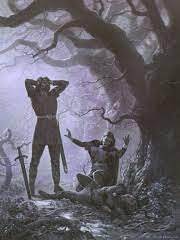
“But as he stood, finding himself free, and ready to sell his life dearly against imagined foes, there came a great flash of lightning above them; and in its light he looked down on Beleg’s face. Then Túrin stood stonestill and silent, staring on that dreadful death, knowing what he had done; and so terrible was his face, lit by the lightning that flickered all about them, that Gwindor cowered down upon the ground and did not raise his eyes.”
Welcome back to another Blind Read! This week we continue to see how Túrin progressed, along with a few more tragedies he had to endure.
We left our heroes betrayed by the Dwarf Mîm. Mîm showed the agents of Morgoth to his home where Túrin, Beleg, and the Outlaws were hiding. Unfortunately, the Orcs took them by surprise, slaying most of them and kidnapping Túrin. We start this week with Beleg, after shunning Mîm for his betrayal, set out to track the orcish horde who had kidnapped his friend.
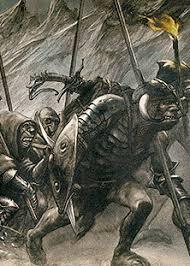
He never lost the track, “and not even in the dreadful woods of Taur-nu-Fuin did he swerve from the trail, for the skill of Beleg was greater than any that have been in Middle-earth.” and he came upon an injured Elf laying at the foot a great dead tree.
This Elf was Gwindor, son of Guilin, who we last saw captured in Nirnaeth Arnoediad by Morgoth and imprisoned to work, forging, and mining gems. But by “secret tunnels known only to themselves the mining Elves might sometimes escape.”
Gwindor saw the group of Orcs pass and saw Túrin with them, chained. Gwindor tried to persuade Beleg not to follow, but nothing could stop Beleg from his quest, so they followed the trail to Thangorodrim. It is here we see the true glory of Beleg Strong Bow.
“When all the camp were sleeping Beleg took his bow, and in the darkness shot the wolf-sentinels, one by one and silently. Then in great peril they entered in, and found Túrin fettered hand and foot tied to a withered tree.”
They snuck in, gathered Túrin, and carried him to a nearby dell, and Beleg took out Anglachel, that cursed blade forged by Eöl the Dark Elf, to cut his bonds. “But fate was that day more strong, for the blade slipped as he cut the shackles, and Túrin’s foot was pricked.”
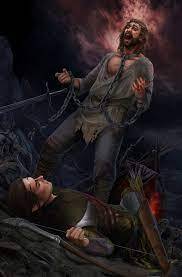
After being beaten and enslaved, he was not in his right mind, and he only knew that someone was hurting him again, but he was free from his bonds, so he lept up “and grappling with him in the darkness, he seized Anglachel, and slew Beleg Cúthalion thinking him a foe.”
We then get the opening quote for this essay. A great storm arose at the death of Beleg and wiped the trail of Túrin and Gwindor, and the Orcs left empty-handed and returned to Morgoth. The man and the Elf buried Beleg there with his bow.
“Thus ended Beleg Strongbow, truest of friends, greatest in skill of all that harboured in the woods of Beleriand in the Elder Days, at the hand of him whom he most loved; and that grief was graven on the face of Túrin and never faded.”
When Tolkien calls this story a tragedy, this is the heart of it. We experienced a story of love and heroism with Beren and Lúthien, and this tale is the other side of the token.
Much of Tolkien is about good versus evil. The battle for the nature of the world. But when the world becomes corrupted, what does it mean to win? The Lord of the Rings has little snippets of these tragedies, but The Silmarillion is unfettered with the need or desire to hold a traditional narrative; thus, Tolkien can show his true intentions.

Tolkien lived and fought through World War One, and where his tales are not allegories, they mirror his experience. In war, you have two similar people; one comes out with what they desired, and one does not. The point is the struggle and how they hold themselves through the process. Of course, the lives of individuals go deeper than this generalization, but the fact is valid.
This tale is a tragedy, and the Beren and Lúthien tale is the book’s heart.
The whole book has a melancholy feel to it. From the first page, you can feel the horrible things coming, and that transcends the entire history (at least so far), but what Tolkien does so well is the infusion of hope in the most desperate times.
At this point in history, Morgoth has won. Over half of Beleriand is his, and he is killing more of the residents. What’s worse is the agents of Morgoth either kill or actively work to drain spirits. Only these few heroes like Turin and Beleg keep the hope alive.
So Túrin walked the lands with Gwindor, grieved and seemingly lost, until they came to the River Sirion and he lay in the waters, and the Love of Ulmo allowed him to release his pain, “and his tears were unloosed at last, and he was healed of his madness.”
He and Gwindor head to Nargothrond to continue the fight and the journey.

The people of Nargothrond welcomed Gwindor with open arms, and they accepted Túrin because he was traveling with the Elf. In time, he grew to be respected, primarily because of his appearance. The Elves knew he was the son of Húrin and Morwen, but he also knew the speech and language of Doriath so that “even among the Elves he might be taken for one from the great houses of the Noldor; therefore many called him Adanedhel, the Elf-Man.” Though we know that being associated with the Noldor isn’t always the best thing.
The smiths in Nargothrond reforged Anglachel to rid it of its horrible connotation, and Túrin renamed it “Gurthang, Iron of Death.” He proved himself to those Elves and became known as Mormegil, The Black Sword. He was considered invisible, so they gave him Dwarven hewn armor and a “dwarf-mark all gilded.”
When Gwindor and Túrin made it back to Nargothrond, Gwindor picked back up with Finduilas, daughter of Orodreth, the current King. Gwindor loved Finduilas to his fullest extent (and is insinuated that he always had), but the curse of Túrin followed even this Elf who broke his bonds. Finduilas fell in love with Túrin and out of love with Gwindor.
Finduilas could not help her love, even after being told that “this man is not Beren.” insinuating that Beren was a once-in-a-lifetime person who could hold onto the love of an Elf and make it work. But the heart wants what the heart wants.
Túrin, taken by surprise, did not return the love, honoring his friendship with Gwindor; but that relationship had turned. Gwindor approached Túrin, and the man tried to plead his case, but Gwindor spoke words no more factual said:
“The doom lies in yourself, not in your name.”
Join me next week as we continue the journey of Túrin!
July 21, 2022
Blind Read Through: J.R.R. Tolkien; The Silmarillion, Of Túrin Turambar Part 2
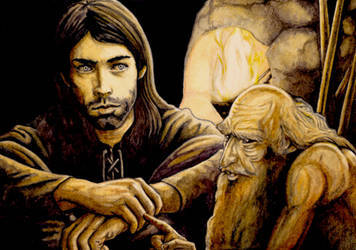
“And now there came another dwarft bearing light to greet him, and they spoke together, and passed swiftly down into the darkness of the cave; but Túrin followed after, and came at length to a chamber far within, lit by dim lamps hanging upon chains. There he found Mîm kneeling at a stone couch beside the wall, and he tore his beard, and wailed, crying one name unceasingly; and on the couch there lay a third. But Túrin entering stood beside Mîm, and offered him aid. Then Mîm looked up at him, and said: ‘You can give no aid. For this is Khîm, my son; and he is dead, pierces by an arrow. He died at sunset. Ibun my son has told me.”
Welcome back to another Blind Read! This week we continue our journey with Túrin as he navigates his trials and tribulations. Last week we read that Tolkien called this story “The Tale of Grief,” and we traverse this story; we’ll see why!
We jump in right where we left off. Túrin leads a band of Outlaws and Beleg Strongbow, picking up the mighty sword Anglachel and some lembas bread and going back out into the wilds to watch over Túrin.
Túrin, however, told Beleg that if he were to find him again, it would be on the slopes of Amon Rûdh, an isolated mountain peak just east of Doriath. So it’s either divine providence or sheer luck that the group of Outlaws would come across three dwarves. So naturally, being outlaws, they attacked the group (I’m assuming to rob them, but it’s not clear. Dwarves were known for their smithing and the gems they mine from the mountain cores) and captured one of them.
This dwarf, named Mîm, pleaded with Túrin “and offered as ransom to lead them to his hidden halls which none might find without his aid.”
And where is this home? “High above the land lies the house of Mîm, upon the great hill; Amon Rûdh is that hill called now, since the Elves changed all the names.”

On the journey to the peak, Tolkien gives us a little taste of what to expect on this journey. One of the Outlaws sees a red flower, seregon, on the ridge, and with the sun shining through it, he says, “There is blood upon the hill-top.”
He thinks this because of how the sun reflected off this flower. Still, in the Quenya tongue, sereg means blood, indicating that whatever happens here won’t be a happy-go-lucky experience.
The trouble starts immediately once the group gets into Mîm’s cave, as we get the quote that begins this essay. It was Túrin who killed Khîm with an arrow. It was Mîm’s clan the outlaws attacked below the peak.
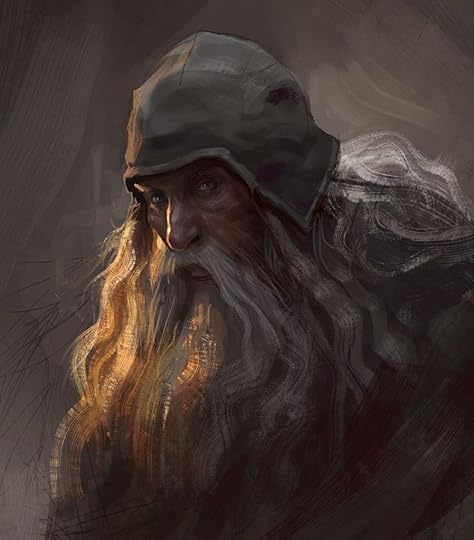
Túrin is apologetic but stands tall. He owns the fact that he applied the killing blow, and because of Dwarven mentalities, Mîm respects him, saying, “You speak like a dwarf-lord of old.“
Túrin learned of Mîm and his people, who were known as the Noegyth Nibin, or the Petty Dwarves. They were outcasts from the Blue Mountains, and they came into Beleriand first, before even the Noldor made their dangerous trip across the sea to this land. As a result, they lost their crafting abilities and “became diminished in stature.” Orcs and Noldor hunted them and considered all creatures of Beleriand enemies, so “they took to lives of stealth, walking with bowed shoulders and furtive steps.”
They were the Dwarves who dug the tunnels which became Nargothrond, but the Noldor pushed them out, and they came here to Amon Rûdh, the Bald Hill, where they made their home.
Living on the hill was difficult, especially since it was “said that the winters worsened in Beleriand as the power of Angband grew.” But Túrin lived there with Mîm and the remaining dwarves and outlaws. Eventually, while holed up in the hill, a figure appeared from the terrible cold no one else dared traverse.
“suddenly among them a man, as it seemed, of great bulk and girth, cloaked and hooded in white; and he walked up to the fire without a word. And when men sprang up in fear, he laughed, and threw back his hood…and in the light of the fire Túrin looked again on the face of Beleg Cúthalion.”
Beleg again tried to coax Túrin to return with him to Doriath, even bringing “out of Dimbar the Dragon-helm of Dor-lómin” to pull at his heartstrings. But Túrin remained steadfast, so Beleg stayed with him. “Those that were hurt or sick he tended and gave them lembas of Melian,” but despite his care, it is evident that he was only there for Túrin, and “hatred of Mîm for the Elf that had come into Bar-en-Danwedh grew ever greater, and he sat with Ibun, his son in the deepest shadows of his house.”
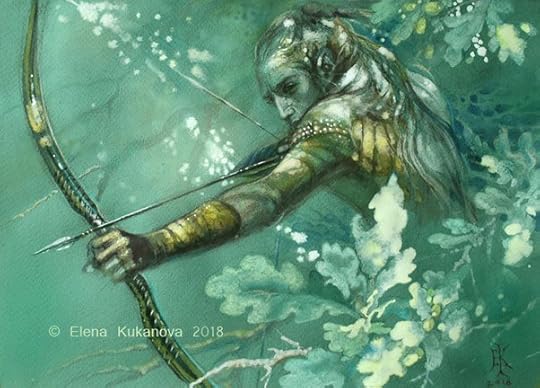
Spring had finally come to Beleriand, but Angband’s reach had grown, and many had lost hope, but “Túrin put on again the Helm of Hador; and far and wide in Beleriand, the whisper went, under wood and over stream and through the passes of the hills, saying that the Helm and Bow that had fallen in Dimbar had arisen again beyond hope. Then many who went leaderless, dispossessed but undaunted, retook heart, and came to seek the Two Captains.” Dor-Cúarthol, the Land of Bow and Helm, and Túrin who “named himself anew” as Gorthol, the Dread Helm.
Their deeds were known far and wide, but finally, Morgoth took notice and realized that Gorthol was Túrin, “Then Morgoth laughed.“
A raiding party of Orcs took Mîm and Ibun captive while they were gathering roots, and Mîm led those Orcs back to his home with a promise that they would not harm Gorthol (Túrin).
“Thus was Bar-en-Danwedh betrayed, for the Orcs came upon it by night at unawares, guided by Mîm. There many of Túrin’s company were slain as they slept; but some fleeing by an inner stair came out upon the hill-top, and there they fought until they fell, and thier blood flowed out upon the seregon that mantled the stone. But a net was cast over Túrin as he fought, and was enmeshed in it, and overcome, and led away.“
Beleg found Mîm after the battle, the dwarf finding Anglachel on the ground and brandishing it at the giant Elf. But Mîm was no match for the large ranger, and Beleg took the sword back from the diminutive dwarf. Then, as Mîm fled, Beleg called after him:
“The vengeance of the house of Hador will find you yet!“
Beleg knew that Túrin had been captured and taken to Angband, so he healed himself from battle and set off to help his friend in the shadow of the bloody seregon on the hilltop.
Join me next week as we continue the tale of Túrin Turambar!
July 14, 2022
Blind Read Through: J.R.R. Tolkien; The Silmarillion, Of Turin Turambar, Part 1

“And now again the might of Angband was moved; and as the long fingers of a groping hand the forerunners of his armies probed the ways into Beleriand. Through Anach they came, and Dimbar was taken, and all the north marches of Doriath. Down the ancient road they came that led through the long defile of Sirion, past the isle where Minas Tirith of Finrod had stood, and so through the land between Malduin and Sirion, and on through the eaves of Brethil to the crossings of Teiglin. Thence the road went on in the Guarded Plain; but the Orcs did not go far upon it, as yet, for there dwelt now in the wild a terror that was hidden, and upon the red hill were watchful eyes od which they had not been warned. For Túrin put on again the Helm of Hador; and far and wide in Beleriand the whisper went, under wood and over stream and through the passes of the hills, saying that the Helm and Bow that had fallen in Dimbar had arisen again beyond hope.”
Welcome back to another Blind Read! This week we are regaled with one of Tolkien’s famous Lays, which later became the book “The Children of Húrin.”
“Here that tale is told in brief, for it is woven with the fate of the Silmarils and of the Elves; and it is called the Tale of Grief, for it is sorrowful, and in it are revealed most evil works of Morgoth Bauglir.”
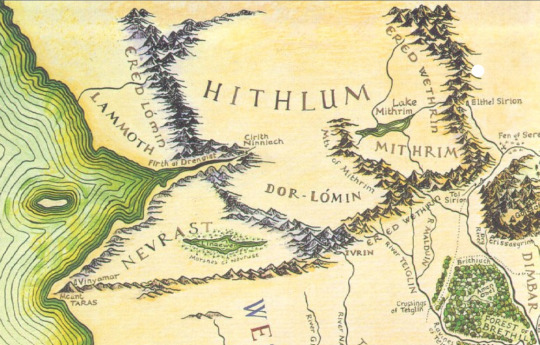
We left off the last chapter with Húrin, Lord of Dor-Lómin (the human duchy by Hithlum in the North East), captured by Morgoth and tied to a pole enduring horrible torture but giving nothing up to that horrific diety.
In that time after Nirnaeth Arnoediad, Easterlings came to Dor-Lómin. These men were subservient to Morgoth, who “despised the remnant people of Hador, and oppressed them, and took their lands and their goods, and enslaved their children.” Still, Morwen, Húrin’s wife and Túrin’s mother, was feared. “and they whispered among themselves, saying that she was perilous, and a witch skilled in magic and in league with the elves.” This fear gave more freedom to Túrin, and she was able to “send him away in secret, and to beg King Thingol to harbour him, for Beren son of Barahir was her father’s kinsman, and he had been moreover a friend of Húrin.“
Beleg Strongbow, part of Beren’s fellowship, found Túrin outside Doriath. Beleg brought Húrin to Menegroth and sent a contingent of Elves to get Morwen back with him. Still, because of the strife of her people, she decided to stay with them in Dor-Lómin but sent back a keepsake for Húrin: “when the Elves departed, she sent with them the Dragon-helm of Dor-Lómin, greatest of the heirlooms of the house of Hador.“

Túrin grew solid and proud in Menegroth under the tutelage of both Thingol and Beleg Strongbow, but he needed more because he “was filled with fear for his mother and his sister.” So he donned his armor and the Dragon-helm and joined Beleg in battle on the marches of Doriath.
Túrin gained notoriety, but that is dangerous for a human in the land of Elves. Because “Now one there was in Doriath, of the people of the Nandor, high in the councils of the King; Saeros was his name.“
Saeros was jealous of Túrin because of his relationship with Thingol, so he bullied and taunted him to the point that Túrin fought back, throwing a goblet and striking Saeros in the face.
Embarrassed, Saeros approached Túrin in the forests outside of Menegroth and tried to best him in a fight. However, Túrin, who had been fighting against Orcs in the marches, quickly overtook him and forced Saeros to do what Saeros frequently said the human woman did, “Run naked as a hunted beast through the woods.”
Saeros was so terrified at his predicament, that he “fell into a chasm of a stream, and his body was broken on a great rock in the water.“

Túrin, knowing that he was a Man among a gathering of Elves, doesn’t feel safe, despite others telling him that Saeros’ fall was not his fault. So he decides to flee the judgment of the Elves, “deeming himself an outlaw and fearing to be held captive.”
Captivity is a prominent theme in this book, and I also think in the larger world of the Lord of the Rings. There are many passages where the characters in question (Beren, Túrin, Fingolfin, Morgoth, Hador, etc.) intimate, or Tolkien tells us through exposition, that they would do anything to escape captivity. Captivity and loss of their freedoms are central themes in these books. The people caught (Maedhros and, more recently, Húrin) were tortured perpetually.
Despite being captured and tortured, I don’t think Tolkien wrote a history of his world to have all characters be afraid of being captive, but instead I think it was Tolkien’s fear of progress and industry which spurned this theme.
When a character gets imprisoned, it’s always in a bleak tower away from all nature. In some ways, I think Tolkien was projecting his fear of what would happen to society if it succumbed to industry. People would no longer be free to head off into the forest and enjoy some good pipe tobacco and a book. Instead, they would be enslaved to the industry and metaphorically tied to towers to watch Morgoth’s fires (or Mordor’s) burn eternally.
The fear of death is secondary to being forced to do another’s bidding. The wars of Beleriand and the wars of the Third Age of Middle-earth are all for this exact reason, much as the real war Tolkien fought in, The First World War. They were wars for the freedom to be who you wanted and move about unmolested. I think that’s why these books still resonate so many years later.
So to escape this enslavement, Túrin ran from Menegroth. He was mistaken, though, because Thingol “took Húrin’s son as my son,” and Thingol grieved that Túrin didn’t believe he would be welcomed back into Menegroth. Beleg Strongbow, also aggrieved, responded to Thingol:
“I will seek Túrin until I find him, and I will bring him back to Menegroth, if I can, for I love him also.”
Beleg ranged and found Túrin, now chief of an outlaw brigade in the forests outside the Girdle of Melian. He tried to persuade Túrin to go back, but because of pride or embarrassment, Túrin refused. He wanted to be his own man, so he sent Beleg away. But Beleg knew that after the battle of Unnumbered Tears, Beleriand was not safe for Túrin to wander with just a few brigands, so he went back to Thingol and asked the King’s leave to guard Túrin from a distance. Thingol agreed and told him to take anything except the King’s sword to aid him in his quest.
“Then Beleg chose Anglachel; and that was a sword of great worth, and it was so named because it was made of iron that fell from heaven as a blazing star; it would cleave all earth-delved iron. One other sword only in Middle-earth was like to it. That sword does not enter into thi tale, though it was made of the same ore by the same smith; and that smith was Eöl the Dark Elf, who took Aredhel Turgon’s sister to wife.“
Thingol warns Beleg, “There is malice in the sword. The dark heart of the smith still dwells in it. It will not lvoe the hand it serves; neither will it abide you long.”
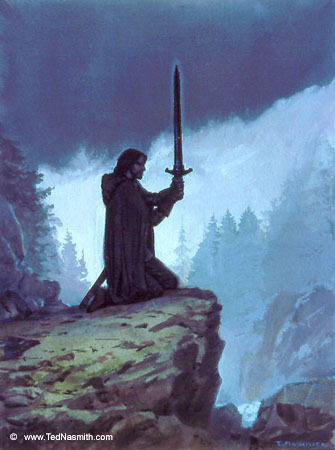
There is no greater foreshadowing than this statement.
Beleg leaves with Anglachel and a gift of Lembas “the waybread of the Elves, wrapped in leaves of silver, and the threads that bound it were sealed at the knots with the seal of the Queen, a wafer of white wax shaped as a single flower of Telperion.”
“and he returned to them no more.”
Join me next week as we continue the tale of Túrin Turambar!
July 7, 2022
Blind Read Through: J.R.R. Tolkien; The Silmarillion, Of the Fifth Battle: Nirnaeth Arnoediad

“Great was the triumph of Morgoth, and his design was accomplished in a manner after his own heart; for Men took the lives of Men, and betrayed the Eldar, and fear and hatred were aroused among those that should have been united against him. So from that day the hearts of the Elves were estranged from Men, save only those of the Three Houses of the Edain.”
Welcome back to another Blind Read! This week we return to war and learn of the battle of Unnumbered Tears and how the Elves’ mistrust of each other and the other races ultimately led to the destruction that came in this battle.
Tolkien starts us off with a small send-off to Beren and Luthien. We learn they “passed beyond the River Gelion into Ossiriand, and dwelt there in Tol Galen the green isle, in the midst of Adurant, until all tidings of them ceased,” they were never to be heard from again.
I believe Tolkien added that little epilogue to their story at the beginning of this chapter because he wanted to have a happier ending for them. When they are together, there is a bit of sadness in the tone of Tolkien’s writing, a melancholy subsumed beneath their love and happiness together. I believe he wanted to start this chapter with that tone partly because they isolated themselves from the hatred of the Noldor, and it’s precisely that viciousness that causes Morgoth’s successes in this battle.
The chapter begins by telling of Maedhros deciding to take arms up against Morgoth because, through Beren and Lúthien’s actions, he saw that Morgoth was fallible. He also understood that alone, the Elves could not fight him. They needed to come together and make a collective assault.
But the Noldor were too prideful. They could not let old grievances lie. The sons of Fëanor said they would only fight with Thingol if he submitted the Silmaril, but he didn’t trust them. Orodreth also would not march with Maedhros “because of the deeds of Celegorm and Curufin.“
So Maedhros turned to the Naugrim (Dwarves) and Men. Fingon in Hithlum to the east, “ever the friend of Maedhros,” also came to aid. Maedhros looked upon his army and “made trial of his strength too soon” and “resolved to assault Angband from east and west.” He would attack from the east and draw out Morgoth’s armies, while Fingon and the Men would pincer from the West.

A great army amassed in the east, and they were ready to fight, but Morgoth’s deception continued. One of the Men, Uldor the accursed, was a spy for Morgoth and was able to delay Maedhros from the attack.
Seeing the might of Fingon’s army, Turgon of Gondolin decided that he must help and sent a leaguer from Hidden Gondolin. But Morgoth had planned and built a massive army. So he sent forth the largest army of Orcs the world had seen, “and yet but part of all that he had made ready.”
Morgoth’s Captain had orders to bring Fingon to the battlefield, but he could not taunt him out, so they sent a party and asked for a parley. Here is where the true evil of Morgoth appears. Gelmir, a Lord of Nargothrond, was sent out to answer the parley, but the legion of Morgoth captured him, “and they hewed off Gelmir’s hands and feet, and his head last, within sight of the Elves.“
This betrayal lit a fire in the Noldor, and Morgoth’s plan succeeded. They charged the field of battle, just as he had planned.
“And in the plain of Anfauglith, on the fourth day of the war, there began Nirnaeth Arnoediad, Unnumbered Tears, for no song or tale can contain all it’s grief. The host of Fingon retreated over the sands, and Haldir lord of the Haladin was slain in the rearguard; with him fell most of the Men of Brethil, and came never back to their woods.”

But Turgon and the Gondolindrim came to the rescue, breaking the ranks of Orcs. But this was Morgoth’s plan all along because now that he had weakened the West, Maedhros finally joined the battle on the east, and “Morgoth loosed his last strength, and Angband was emptied. There came wolves, and wolfriders, and there came Balrogs, and dragons, and Glaurung father of dragons.“
They battled fiercely, but the force was not Morgoth’s greatest weapon because “…neither by wolf, nor by Balrog, nor by dragon, would Morgoth have achieved his end, but for the treachery of Men. In this hour the plots of Ulfang were revealed. Many of the Easterlings turned and fled, their hearts being filled with lies and fear; but the sons of Ulfang went over suddenly to Morgoth and drove in upon the rear of the sons of Fëanor, and in the confusion that they wrought they came near to the standard of Maedhros.“
The remaining sons of Fëanor could flee, “gathering a remnant of the Noldor and the Naugrim,” and most of the treacherous men were slain by Morgoth when they came to collect on the reward he had promised them for their betrayal.

It came down to one last force to make a stand. The Dwarves of Belegost, “and thus they won renown.” They could withstand heat much better than either Men or Elves, and “it was their custom moreover to wear great masks in battle hideous to look upon.” So the Dwarves drove off Glaurung and the dragons losing Azaghâl, Lord of Belegost.
Meanwhile, Fingon and Turgon were surrounded by “a tide of foes thrice greater than all the force that was left to them.” A multitude of Balrogs surrounded Fingon, and Gothmog turned to face Fingon. “That was a grim meeting.”
They battled one on one in a brutal and epic fight until one of the Balrog “cast a throng of fire about him.”
“Then Gothmog hewed him with his black axe, and a white flame sprang up from the helm of Fingon as it was cloven. Thus fell the High King of the Noldor; and they beat him into dust with their maces, and his banner, blue and silver, they trod into the mire of his blood.“
Once Fingon had died, Húrin and Huor, the Men of Hador, told Turgon to retreat, and they would guard his exit. Fingon was able to withdraw back into the mountains, to hold fast in Gondolin to be the last bastion of the North against Morgoth. While Húrin and Huor fought against Morgoth’s armies and died, “Thus was the treachery of Uldor redressed.“
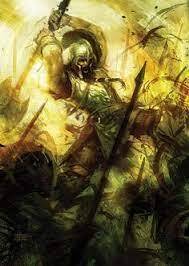
Húrin made a name for himself fighting the Troll-guard of Gothmog, crying out, “Aurë entuluva!” (Day shall come again!) with every kill, he too eventually fell.
“Thus ended Nirnaeth Arnoediad.“
The opening quote of the essay follows. The lords of the North were defeated, and they no longer held their lands. “The Orcs and the wolves went freely through all the North and came further southward into Beleriand. They destroyed the Havens and círdan and took over all of the North, leaving only Gondolin, the hidden kingdom, and Doriath, the last two great kingdoms.“
There are tales of courage and horror following the battle of Unnumbered Tears, and Tolkien leaves us with a paragraph of woe and hope in the great horror that Beleriand had become:
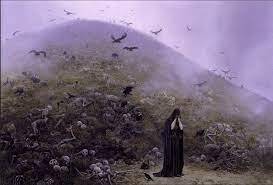
“By the command of Morgoth the Orcs with great labour gathered all the bodies of those who had fallen in the great battle, and all their harness and weapons, and piled them in a great mound in the midst of Anfauglilth; and it was like a hill that could be seen from afar. Haudh-en-Ndengin the Elves named it, the Hill of Slain, and Haudh-en-Nirnaeth, the Hill of Tears. But grass came there and grew again long and green upon that hill, alone in all the desert that Morgoth made; and no creature of Morgoth trod thereafter upon the earth beneath which the swords of the Eldar and the Edain crumbled to rust.“
June 30, 2022
Blind Read Through: J.R.R. Tolkien; The Silmarillion, Of Beren and Lúthien, Conclusion

“They came at last to the gates of Menegroth, and a great host followed them. Then Beren led Lúthien before the throne of Thingol her father; and he looked in wonder upon Beren, whom he had thought dead; but he loved him not, because of the woes that he had brought upon Doriath. But Beren knelt before him, and said: ‘I return according to my word. I am come now to claim my own.‘”
Welcome back to another Blind Read! This week we pick up right where we left off. Beren and Lúthien survived the battle with Sauron and were in the outskirts of the forests of Doriath.
Celegorm and Curufin found them there and attacked them, thinking of kidnaping Lúthien and taking her as a bride of the Noldor, when a familiar face came to their rescue:
“Then Beren throttled Curufin; but Death was near him, for Celegorm rode upon him with a spear. In that hour Huan forsook the service of Celegorm and sprang upon him…”
With the help of Huan, the sons of Fëanor were subdued and yielded to Beren and Lúthien, but revenge was in the Noldor hearts. Curufin shot a bow as they retreated, intending to kill Lúthien, but Beren dove in front of his love and took the arrow to his chest.

Huan gathered herbs after chasing off Curufin and Celegorm, and “with that leaf she staunched Beren’s wound, and by her arts and by her love she healed him; and thus they returned to Doriath.”
But Beren couldn’t take the thought of failing on his quest twice, so in the middle of the night, when Lúthien slept, he left to pursue the Silmaril.
When Lúthien woke, however, she saw that he was gone and sang her song to Huan for help. “Huan, consenting once more to be her steed, had borne her swiftly hard upon Beren’s trail.” Huan took the guise of Draugluin, Sauron’s wolf captain, and Lúthien took the guise of Thuringwethil, who “was the messenger of Sauron, and was wont to fly in vampire’s form to Angband.”
In these disguises, they caught up with Beren. Beren is quiet at first, hoping to shield Lúthien from “the shadow of Morgoth,” but Huan speaks up: “From the shadow of Death you can no longer save Lúthien, for by her love she is now subject to it. You can turn from your fate and lead her into exile, seeking peace in vain while your life lasts. But if you will not deny your doom, then either Lúthien, being forsaken, must assuredly die alone, or she must with you challenge the fate that lies before you.“
Encouraged, Beren decided he could no longer deny Lúthien and donned the werewolf disguise; Lúthien put on her vampire bat costume and found their way to Angband.
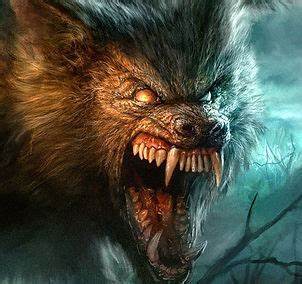
Meanwhile, Morgoth, aware the Huan was near, “chose one from among the whelps of the race of Draugluin; and he fed him with his hand upon living flesh, and put his power upon him.“
This whelp grew to enormous size and became Carcharoth, the Red Maw.
Carcharoth stationed himself in front of the gates, so when Beren and Lúthien came upon him, he stood tall before them, but it was Lúthien who threw off her disguise and stood “small before the might of Carcharoth, but radiant and terrible.” She cast a spell over him with her song and sent him into a deep slumber.
Disguised, the two made it to Morgoth’s chambers, but Lúthien’s disguise didn’t fool Morgoth. “Then Morgoth looking upon her beauty conceived in his thought an evil lust and a design darker than any that had yet come into his heart since he fled from Valinor.”
There is only inference to what he had in mind, but the way Tolkien writes him, there is some terrible sexual connotation which is supposed to indicate the level of evil Morgoth has become. But, of course, the world Tolkien grew up in was one of war, so physical damage might not indicate being evil, only a means to an end. Still, sexual torture and unnecessary damage to “the fairer” sex shows just how deep a level of moral poverty is in Morgoth.

So how do you counter that? By having Lúthien trick him and cast a spell upon him to make him fall asleep and fall from his throne, “The iron crown rolled echoing from his head.” I’ll post the passage in the postscript if you want to read it, but it shows Lúthien is the real hero, despite building Beren up at the beginning of the chapter. She was able to stand up to the horrible abuser and put him into his rightful place, without fear but with determination.
Beren took up his knife, Angrist, and cut off a Silmaril from the crown, but the blade snapped before he could take more.
The two lovers fled the hall, meaning to escape from Angband before Lúthien’s spell wore off, but Carcharoth had already risen and was blocking the gate, sealing them in. The two fierce warriors battled the beastly wolf, but when it saw the Silmaril, he bit for it and took Beren’s hand at the wrist, Silmaril and all.
Lúthien again healed Beren’s wounds, but they tarried too long, and the host of Angband had awoken. All seemed lost, but Huan again came to the rescue. He saw that Carcharoth had fled Angband and caused devastation upon his path, so Huan called for Thorondor, the King of the Eagles, and they flew to Angband and lifted Beren and Lúthien to the woods bordering Doriath.

Thingol was surprised to see the two lovers because of the tales he had heard. He was ready to attack the sons of Fëanor because of rumors that Curufin killed Beren and the Celegorm was to wed Lúthien, but Beren one-handed, and Lúthien appeared before Thingol and Beren gave his speech which started this essay.
Thingol asked for the prize, and Beren held out his stump. Then, understanding, Thingol’s demeanor softened towards Beren: “And it seemed to Thingol that this Man was unlike all other mortal Men, and among the great in Arda, and the love of Lúthien a thing new and strange; and he perceived that any power of the world might not withstand their doom. Therefore, at last, he yielded his will, and Beren took the hand of Lúthien before the throne of her father.“
It seemed as though the chapter should end because the lovers were married, and all parties were happy, yet Carcharoth was ravaging the north, “And Beren, hearing of the onslaught of the Wolf, understood that the quest was not yet fulfilled.“
They formed a hunting party with Huan, Mablung of the Heavy Hand, Beleg Strongbow, Beren, and Thingol to go and end Carcharoth. Upon finding him, there was a significant battle, but one last time, Huan came to the rescue and killed the Red Maw. Carcharoth had one final blow and poisoned Huan to Death: “Beren spoke not, but laid his hand upon the head of the hound, and so they parted.”
They cut open Carcharoth’s stomach, and Beren held the Silmaril aloft, stating, “Now is the quest achieved.”
When they returned to Doriath, Lúthien sang a song of love and sorrow to Mandos the Valar so that she and Beren could stay together in their passion.

“These were the choices that he gave to Lúthien. Because of her labours and her sorrow, she should be released from Mandos, and go to Valimar, there to dwell until the world’s end among the Valar, forgetting all griefs that her life had known. Thither Beren could not come. For it was not permitted to the Valar to withhold Death from him, which is the gift of Ilúvatar to Men. But the other choice was this: that she might return to Middle-earth, and take with her Beren, there to dwell again, but without certitude of life or joy. Then she would become mortal, and subject to a second death, even as he; and ere long she would leave the world for ever, and her beauty become only a memory in song.”
“This doom she chose.”
Beren and Lúthien lived to the end of their days, mortal and happy, and this opened the door to all others who love and told they shouldn’t, including Aragorn and Arwen.
The world of Beleriand is in turmoil, and there is another battle on the horizon.
Join me next week as we delve into “Of the Fifth Battle: Nirnaeth Arnoediad.”
Post Script:
“Then suddenly she eluded his sight, and out of the shadows began a song of such surpassing loveliness, and such blinding power, that he listened perforce; and a blindness came upon him, as his eyes roamed to and fro, seeking her.
And his court were cast down in slumber, and all the fires faded and were quenched; but the Silmarils in the crown on MOrgoth’s head blazed forth suddenly with a radiance of white flame; and the burden of that crown and of the jewels bowed down his head, as though the world were set upon it, laden with a weight of care, of fear, and of desire, that even the will of Morgoth could not support. Then Lúthien catching up her winged robe sprang into the air, and her voice came dropping down like rain into pools, profound and dark. She cast her cloak before his eyes, and set upon him a dream, dark as the Outer Void where once he walked alone. Suddenly he fell, as a hill sliding in an avalanche, and hurled like thunder from his throne lay prone upon the floors of hell. The iron crown rolled echoing from his head. All things were still.”
June 23, 2022
Blind Read Through: J.R.R. Tolkien; The Silmarillion, Of Beren and Lúthien part 3

“Then Celegorm turned his horse, and spurned it upon Beren, purposing to ride him down; but Curufin swerving stooped and lifted Lúthien to his saddle, for he was a strong and cunning horseman. Then Beren sprang before Celegorm full upon the speeding horse of Curufin that had passed him; and the Leap of Beren is renowned among Men and Elves. He took Curufin by the throat from behind, and hurled him backward, and they fell to the ground together.“
Welcome back to another Blind Read! This week we continue the tale of Beren and Lúthien while highlighting the betrayal of the Noldor and the heroics of our two protagonists.
Last week we saw Beren take off on his quest to gather a Silmaril through Felagund’s realm. Weary of the duplicitous nature of his kin (Curifin and Celegorm), Felagund joins Beren on his quest to ensure the Silmaril doesn’t fall into the wrong hands.
They traveled towards Angband, and “Beneath the Shadowy Mountains, they came upon a company of Orcs.” Felagund used his magic to make the two of them look like Orcs so they could join the Orcish gang to travel to Taur-Nu-Fain. But Sauron knew of their disguises and sent his servants to intercept them. He succeeded in capturing them, “But though their kinds were revealed, Sauron could not discover their names or purposes,” so he threw them into a pit to imprison them.

Lúthien sensed something was wrong and went to Melian for assistance, to which she found none. Instead, she was sent to her room, a “mighty beech (was) named Hírilorn” like a naughty twelve year old. She used her Elven arts and disguised herself to escape from the home in the tree and go after Beren.
At this time, Curufin and Celegorm were out hunting the wolves of Sauron, and with them, we have introduced to possibly the most essential tertiary character of this tale: Huan.
“Now chief of the wolfhounds that followed Celegorm was named Huan. He was not born in Middle-earth, but he came from the Blessed Realm; for Oromë had given him to Celegorm long ago in Valinor, and there he had followed the horn of his master, before evil came. So Huan followed Celegorm into exile, and was faithful; and thus he too came under the doom of woe set upon the Noldor, and it was decreed that he should meet death, but not until he encountered the mightiest wolf that would ever walk the world.”
Remember the last line. It will be crucial next week!
Huan found Lúthien and brought her to Celegorm, who “promised that she would find help in her need if she returned with him now to Nargothrond,” but he betrayed her Lúthien. He imprisoned her, “believing that Beren and Felagund were prisoners beyond hope of aid, they purposed to let the king perish, and to keep Lúthien, and force Thingol to give her hand to Celegorm.” The two brothers thought only of power and didn’t care whom they hurt to get it.
But it was Huan who came to the rescue. He was true of heart and hated to see Lúthien caged, so he “led her by secret ways out of Nargothrond, and they fled north together.”

Little did she know that in the north, Sauron sent one of his wolves into the prison to kill Beren, “But when the wolf came for Beren, Felagund put forth all his power, and burst his bonds; and he wrestled with the werewolf, and slew it with his hands and teeth; yet he himself was wounded to the death.” and because of his heroics in saving Beren he “redeemed his oath.” and was able to take his long rest “in the timeless halls beyond the seas and the Mountains of Aman.“
Then “In that hour Lúthien came, and standing upon the bridge that led to Sauron’s isle she sang a song that no walls of stone could hinder.“
Sauron heard this song and knew it for Lúthien, Melian’s daughter, and sent his wolves to capture her but Sauron didn’t know that the Huan accompanied her; “and Huan one by one Huan took them by the throat and slew them.” Sauron even sent Draugluin, “a dread beast, old in evil, lord and sire of the werewolves of Angband.” Yet Huan even slew him.
Sauron probably said that old phrase, “if you want something done right, you have to do it yourself.” he turned himself into a werewolf, “…the mightiest that had yet walked the world.” So he sprang upon them, and Huan battled him in a skirmish for the ages, and Huan came out the victor. Sauron yielded and pleaded release, and Huan let released him. “And immediately he took the form of a vampire, great as a dark cloud across the moon, and he fled, dripping blood from his throat upon the trees, and came to Taur-Nu-Fain, and dwelt there, filling it with horror.”
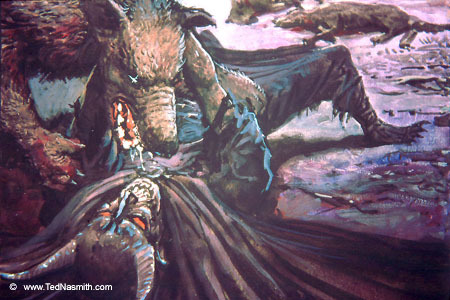
If you recall, from a few weeks ago, I contended that Taur-Nu-Fain (then called Dorthianian) was, in fact, Mordor of the Third Age. I believe this passage confirms that, because we have an area surrounded by mountains, Ungoliant’s children (Shelob) live in those mountains, and are just across from Minas Tirith. Sauron filled Taur-Nu-Fain with horror and turned it into the land where he forged the One Ring.
After Sauron fled, Lúthien and Huan head down into the pits, past the cowering thralls of Sauron, and find Beren “mourning by Felagund.” They brought the king’s body out and buried him in a proper ceremony so that “Finrod walks with Finarfin his father beneath the trees in Eldamar.“
Beren and Lúthien decide to hide in the forest and enjoy their love together. Huan returned to Celegorm out of only faithfulness because the Noldor prince’s actions destroyed his trust and honor in Celegorm.
Celegorm and Curufin’s plans came to fruition. They waited around and let Felagund die, thinking they would take the throne. Still, the subjects of Nargothrond “lamented bitterly the fall of Felagund their king, saying that a maiden had dared that which the sons of Fëanor had not dared to do; but many perceived that it was treachery rather than fear that had guided Celegorm and Curufin. Therefore the hearts of the people of Nargothrond were released from their dominion, and turned again to the house of Finarfin; and obeyed Orodreth (Finrod Felagund’s son).”
They fled to Himring to hide with their brother Maedhros and Huan went with them out of duty.
But Beren, living with his love Lúthien “near the borders of Doriath,” could not forget his oath and the possibility to live with Lúthien honorably. Lúthien, however, is not a passive princess from some other tale. She is a warrior queen, and though this is a love story, she has agency all of her own. She tells Beren:
“You must choose, Beren, between these two: to reliquish the quest and your oath and seek a life of wandering upon the face of the earth; or to hold to your word and challenege the power of darkness upon it’s throne. But on either road I shall go with you, and our doom shall be alike.“
It wouldn’t be much of a story if they didn’t charge once more into the breach, so join me next week as we conclude the story of Beren and Lúthien!
June 16, 2022
Blind Read Through: J.R.R. Tolkien; The Silmarillion, Of Beren and Lúthien, pt. 2

“My fate, O King, led me hither, through perils such as few even of the Elves would dare. And here I have found what I sought not indeed, but finding I would possess for ever. For it is above all gold and silver, and beyond all jewels. Neither rock, nor steel, nor the fires of Morgoth, nor all the powers of the Elf-kingdoms, shall keep from me the treasure that I desire. For Lúthien your daughter is the fairest of all the Children of the World.”
Welcome back to another Blind Read! This week we continue the tale of the star-crossed lovers while deconstructing themes of selfishness and fear in Elvishkind, which we’ve mentioned before.
Last week we learned of Beren’s beginnings and his fight to exit Dorthonian and head south to Doriath. The path was dangerous, and by the time he made it to Doriath, he was “grey and bowed as with many years of woe, so great had been the torment on the road.” But it was there in the forests he espied “Lúthien… the most beautiful of all the Children of Ilúvatar.”

She was dancing and singing in the woods in a beautiful voice “he called her Tinúviel, that signifies Nightingale,” and upon viewing her and listening to her song, “all memory of his pain departed from him.“
He was instantly in love with her light and beauty, and he followed her dumbfounded, trying to speak but muted by her brilliance. When he was finally able to talk, Beren approached Lúthien, and Tolkien gives us a curious passage: “But as she looked on him, doom fell upon her, and she loved him.“
We will see soon that though this is Tolkien’s heart of The Silmarillion, Beren and Lúthien’s love signifies the end of Elvish rule in Beleriand. Morgoth is merely a means to an end, but the Hubris of the Elves marks their destruction. Whether it be Fëanor and his firey drive to kill Morgoth, Turgon’s desire to forsake others for his own people’s safety, or Thingol’s parental urge to “know” what is suitable for his daughter, these are the traits that brought the Elves down, not Morgoth.
Lúthien hid her love for Beren for a while, just as she hid him in the forest. She knew her love for a human was wrong, but she couldn’t help herself because “no others of the Children of Ilúvatar have had joy so great, though the time was brief.”
But there was a danger because “Daeron the minstrel also loved Lúthien, and he espied her meetings with Beren and betrayed them to Thingol.”

Thingol was beyond angry, but it was because of his Hubris as an Elf and fear as a father. He declared Beren a thief and a scoundrel, though reading it closely, one can tell that he can’t believe a man was able to do what no other being could – traverse the Girdle of Melian and enter the lands. He was also terrified of this man taking his daughter and what kind of dangerous life she would have with him because his pride could not allow Beren to remain in Doriath.
Lúthien speaks to Beren’s defense before Thingol tells her, “Let Beren speak!” Beren’s response is the quote that opens this essay.
Thingol still tries to find a way around his predicament. Finally, he accuses Beren of being a thrall or a spy of Morgoth, to which Beren responds:
“By the ring of Felagund, that he gave to Barahir my father on the battlefield of the North, my house has not earned such names from any Elf, be he king or no.“
He shows the Ring of Felagund, which we will see in the Third age, on the hand of Aragorn. Viewing this Ring and hearing his wife Melian’s caution, Thingol devised a plan. He tells Beren that if he wants his daughter’s hand in marriage, he would, “Bring to me in your hand a Silmaril from Morgoth’s crown.”
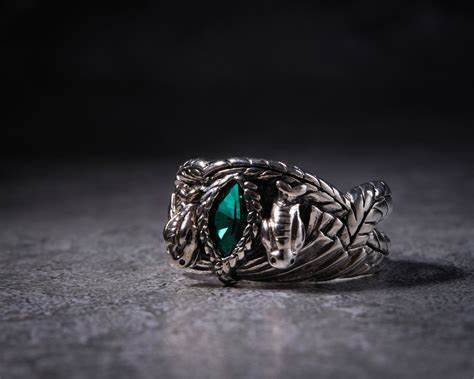 Barahir’s Ring, later worn by both Beren and Aragorn
Barahir’s Ring, later worn by both Beren and AragornThen, “he wrought the doom of Doriath and was ensnared within the curse of Mandos.” Because of his fear, he gave Beren an impossible task, bringing Doriath into the larger world. If Beren failed, Thingol would lose his daughter because of the knowledge of condemning Beren to an impossible task. If he succeeded, having a Silmaril would bring down the wrath of both the Noldor and the Valar. Thingol sealed his fate.
Beren, of course, accepts the mission. The young warrior heads north out of Doriath towards the wastes of Taur-Nu-Fuin, what was once Dorthonian – what was once his home. As he traveled, Beren realized he was spied upon, so he shouted to the hidden warriors and showed the Ring of Felagund; “Thus Beren came before King Finrod Felagund.”
He told the King what had befallen his father, and he said of his adventures, finally revealing to the King his quest to secure a Silmaril for Thingol so that he may be with his love. Finrod tells him:
“It is plain that Thingol desires your death; but it seems that his doom goes beyond his purpose, and that the Oath of Fëanor is again at work. For the Silmarils are cursed with an oath of hatred, and he that even names them in desire moves a great power from slumber; and the sons of Fëanor would lay all the Elf-kingdoms in ruin rather than suffer any other than themselves to win or possess a Silmaril, for the Oath drives them.”
 Finrod’s Council
Finrod’s CouncilBeren’s appearance came after the time of the Battle of Sudden Flame, when Curufin and Celegorm had fled to Nargothrond with them. The curse of Fëanor was strong, and the Hubris of the Noldor was even more potent. The sons of Fëanor would take their desire to gain the Silmarils to any extent, and Finrod knows this.
“And after Celegorm Curufin spoke, more softly but with no less power, conjuring in the minds of the Elves a vision of war and the ruin of Nargothrond. So great a fear did he set in thier hearts that never after until the time of Túrin would any Elf of that realm go into open battle; but with stealth and ambush, with wizardry and venomed dart, they pursued all strangers, forgetting the bonds of kinship.“
Much like we have seen in the Third Age, the Silmarils call out to the Noldor as the One Ring does. But unfortunately, their power corrupts absolutely, and their meaning has blinded the Noldor to bring about their demise.
Curufin and Celegorm, knowing they are the next in line to be King if Finrod falls in battle, encourage him to go and help Beren steal a Silmaril from Morgoth, “whatever betide.“
Join me next week as we continue Beren’s quest for the Silmaril and Lúthien’s hand in marriage!
June 9, 2022
Blind Read Through: J.R.R. Tolkien; The Silmarillion, Of Beren and Lúthien

“Among the tales of sorrow and of ruin that come down to us from the darkness of those days there are yet some in which amid weeping there is joy and under the shadow of death light that endures. And of these histories most fair still in the ears of the Elves is the tale of Beren and Lúthien. Of their lives was made the Lay of Leithian, Release of Bondage, which is the longest save one of the songs concerning the world of old; but here the tale is told in fewer words and without song.”
Welcome back to another Blind Read! This week we begin the epic tale of Beren and Lúthien by witnessing Beren’s beginnings and growth into the epic warrior he was to become.
The quote above begins the chapter, and we quickly learn of the Outlaws of Dorthonian led by Barahir, Beren’s father. These were the last twelve human men living in Dorthonian because “Barahir would not forsake” it. Pursued by Morgoth, these men hid in the moors of the highlands of that region at a lake named “Tarn Aeluin.”
“The waters of Tarn Aeluin were held in reverence, for they were clear and blue by day and by night were a mirror for the stars; and it was said that Melian herself had hallowed that water in days of old.“
These Men lived in peace for several years until one of the Outlaws, Gorlim, came home from a battle and “found his house plundered and forsaken, and his wife gone; whether slain or taken he knew not.”
Despite plundering this house, the Outlaws remained hidden and were a thorn in Morgoth’s side, so he “commanded Sauron to find them and destroy them.“

Sauron learned of Gorlim’s loss and, with his sorcery, set an illusion of Gorlim’s wife in the house. Then, when he came back from ranging, he saw her image in the place, “and her face was worn with grief and hunger, and it seemed to him that he heard her lamenting that he had forsaken her.”
Sauron’s trap had worked. Agents of Sauron captured Gorlim and “tormented him, seeking to learn the hidings of Barahir and all his ways. But nothing would Gorlim tell.”
The torment continued until Sauron finally offered Gorlim’s wife back to him. “Then Sauron laughed; and he mocked Gorlim, and revealed to him that he had seen only a phantom devised by wizardry to entrap him; for Eilinel (Gorlim’s wife) was dead.“
But he still promised to bring her back, and “In this way the hiding of Barahir was revealed.”
Morgoth’s agents descended on the troop and brutally slaughtered them. Fortunately, Beren, son of Barahir, was off-ranging when the devastation happened.
Beren returned after having a prophetic dream, telling of his father’s murder, but he was too late. He saw his fellow Outlaws dead next to the Tarn Aeluin. “There Beren buried his father’s bones, and raised a cairn of boulders above him, and swore upon it an oath of vengeance.”
Beren tracked the Orc party to their camp “at Rivil’s Well above the Fen of Serech.“
“There their captain made boast of his deeds, and he held up the hand of Barahir that he had cut off as a token for Sauron that their mission was fulfilled; and the ring of Felegund was on that hand. Then Beren sprang from behind a rock, and slew the captain, and taking the hand and the ring he escaped.“
For four years, Beren wandered Dorthonian as a “solitary outlaw.” Finally, he became one with the land, and “he became the friend of birds and beasts, and they aided him… and from that time forth he ate no flesh nor slew any living thing that was not in the service of Morgoth.”
Beren “did not fear death, but only captivity, and being bold and desperate he escaped both death and bonds; and the deeds of lonely daring he acheived were noised abroad throughout Beleriand, and the tale of them came even into Doriath.”

His deeds became so legendary that Orcs would flee instead of standing up against him if he were near. Finally, Morgoth became distraught that a man was causing such havoc in a land he was supposed to be in control of, so he ordered Sauron to flood the land with his armies to flush Beren out. “Sauron brought werewolves, fell beasts inhabited by dreadful spirits that he had imprisoned in their bodies.”
Dorthonian “was now become filled with evil, and all clean things were departed from it.” Sauron’s plan to find him didn’t work, but the land had become so overrun that Beren fled south, “There it was put into his heart that he would go down into the Hidden Kingdom” of Doriath.
“Terrible was his southward journey” through Ered Gorgoroth, where so many others had perished in that land “where the sorcery of Sauron and the power of Melian came together.“

Beren was known for many great deeds during his lifetime, and “that journey is not accounted least among the great deeds… but he spoke of it to no one after, lest the horror return to his mind.” That region is one of horror in Beleriand, save only for Angband itself. “There spiders of the fell race of Ungoliant abode, spinning their unseen webs in which all living things were snared; and monsters wandered there that were born in the long dark before the sun, hunting silently with many eyes.”
Imagine wandering through a land filled with creatures like Shelob from Return of the King and other creatures whose sole purpose was to destroy all that came from the light. This evil land survived independently from Morgoth because Ungoliant was the only creature Morgoth truly feared, yet Beren, with all his might,uuj]1 made his way through unscathed.
He finally “passed through the mazes that Melian wove about the kingdom of Thingol… grey and bowed as with many years of woe.”

But it was there in the forests of Doriath his journey was complete because “wandering in the summer in the woods of Neldoreth he came upon Lúthien, daughter of Thingol and Melian, at a time of evening under moonrise.“
The two star-crossed lovers have finally met. Join me next week as we discover how they last through a disapproving father and a curse that will come to doom Doriath.



